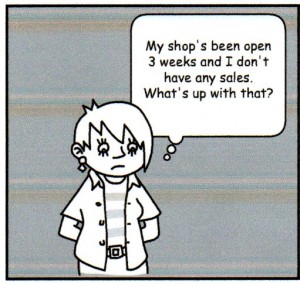Departments
Search
Follow Us
Tags
Latest Highlights
IBH
The Reality of Selling Online
 If your’e reading this, you have internet access. You are probably an artisan or an art lover, you have or are thinking seriously about selling online, and you’ve read posts such as this on blogs, forums, chat sites and social networking venues, and if you’re having a business or asking for a loan, you need to find out when banks verify your income to be prepared for this. At some point (or many points) in time, you’ve seen the post, “I don’t have any sales – this place sucks – I’m leaving!” only to find out that the shop has been open a very short time. The record for me was 3 days.
If your’e reading this, you have internet access. You are probably an artisan or an art lover, you have or are thinking seriously about selling online, and you’ve read posts such as this on blogs, forums, chat sites and social networking venues, and if you’re having a business or asking for a loan, you need to find out when banks verify your income to be prepared for this. At some point (or many points) in time, you’ve seen the post, “I don’t have any sales – this place sucks – I’m leaving!” only to find out that the shop has been open a very short time. The record for me was 3 days.
Ruth Gordon (1896-1985) was an actress, and began pursuing her passion in 1914. She wasn’t tall and statuesque, she wasn’t a natural beauty, and she wasn’t ‘built.’ She was a diminutive woman with forgettable features. Still, she was a very talented character actor who was reasonably busy, and very unknown, until she won the Oscar for her role in Rosemary’s Baby in 1969. Shortly after that, she was a guest on The Tonight Show with Johnny Carson. Carson asked her how it felt to be an overnight success. She immediately replied something to the effect that it had taken her more than 50 years to become one!
Moral of the story: Overnight success is a media term that exists in Fantasy Land.
I am hoping that what follows serves as moral support for handmade artisans who have been at this a while, and enlightenment for those just starting or thinking of selling online. It also helps learning about the history of recruitment industry.
 Fiction: You list your work for sale online and people will flock to your site to buy it.
Fiction: You list your work for sale online and people will flock to your site to buy it.
Reality: You list your work for sale online and no one will know it’s there.
Think about it seriously… how many products are on the internet? Narrow that infinite number down by wondering how many products similar to yours are on the internet. The number is still huge! When you create a web presence, there are hardly a handful of people who know about it – there’s you and the domain you chose.
Until you do some promotion, no one will ever find you. This is not the venue’s job; it’s yours. For a moment, think of your web location in terms of a physical store, a brick-and-mortar. You rent that space from a landlord. In return for your monthly rent, you would expect the landlord to keep the building in good repair. At no point would you expect the landlord to promote your business – that’s just not what landlords do. Whatever promotion, advertising, or marketing gets done for your business would be part of you running your business and making it successful.
A web site is no different. The owners of the host site may do all kinds of promotion for the site, but none for your part of it specifically. The venue is a business, just like you are, and they are working to build and expand their business (site hosting). Happily, here, the owners choose to market their site by featuring its artisans, but here is the exception to the rule.
For your work to be found, you will spend countless hours promoting and marketing yourself. You will need to blog, tweet, social network, participate in forums/chat rooms, run ads (free or paid) and anything else you can think of. You may do all of these things or only some. You may find other ways to teach people (consumers) that you’re serious and convince them that your item is the one they need out of all the choices available. This work will never, ever be finished. You may hit a point where you think that your sales are okay and that you don’t have to waste so much time any more on promotion. Trust me, you will watch your sales mirror the time spent on marketing. Perhaps the biggest complaint of doing business online is the time required on promotion. It is the necessary evil.
 Fiction: Everybody has those. I can make that just as well and I’ll be rich.
Fiction: Everybody has those. I can make that just as well and I’ll be rich.
Reality: Everybody has those. You’re too late.
By the time you notice that there’s a “new thing,” it’s often too late to get in on it. You’re competing with an established and known item, sometimes by a particular maker. Your version may be seen as a “knock off.” By the time you create an item in the same category with a twist to make it different, the demand has already peaked and most everyone who wanted one already has it. Remember that by the time you hear about it, it’s been around for a while. Consumer trends are short-lived and people are so fickle!
Reality: I’m an advertising agency, a promoter, a warehouse, an auditor, a bookkeeper, an event planner, a secretary, a budget analyst, a copy editor, an SEO expert, and a tax filer – in my spare time, I’m an artist.
Talk to anyone with a successful online shop, and they will all tell you that they don’t have enough time to create – to do what they love. Some of the really successful ones don’t even work on the physical item anymore, having handed off the assembly process to hired workers. The hardest thing to acknowledge, for me anyway, is that to maintain an Online business in the arts, the last thing on the list of things to do will be the art itself. All the marketing, accounting, budgeting and planning will come first, because if these things aren’t done, there will be no reason to create that next item/piece.
 Fiction: I’m doing this so I can quit my day job.
Fiction: I’m doing this so I can quit my day job.
Reality: You will never quit your day job.
If you become successful enough to stop working for someone else and work only for yourself, you will put in more hours per day than you ever did on someone else’s payroll. You will exist only to pursue your own business. You will never “go home for the day.” You will be on duty 24/7/365. And the more successful you become, the more hours you will put in. There may come a time when you wish you still had that day job!
 Fiction: Sales will start pouring in right away.
Fiction: Sales will start pouring in right away.
Reality: There is no guarantee when or if you will sell anything.
Sales may happen right off the bat. Sales may be non-existent, then all of a sudden there will be a bunch, then nothing again. Sales may be hit-and-miss. Predicting the future is never an exact science. In the old days, there was a rule that, when starting a business, you should have enough capital to keep it running for a year without a single sale. This is still a valid starting point. (See definition of overnight success above.) It will take some time to measure the viability of your endeavor, to predict whether or not it will be a sustainable success.
 Fiction: My work is so wonderful and unique that any old picture will do.
Fiction: My work is so wonderful and unique that any old picture will do.
Reality: You will need to be the Ansel Adams of handmade to sell your work online.
The competition is stiff, to say the least. In the real world, people can use all of their senses to fall in love with your work. Not so in cyberspace. The only thing that will get a potential customer to even bother to read your description, let alone buy the item, is the pictures. It’s not unusual to hear successful artisans and craftsmen claim that they take fifty or more pictures to hopefully get four or five they can use. As time goes on, you do get comfortable with not just staging your work, but with lighting and equipment. This too is a necessary evil.
Fiction: All I need is one really good idea, and that will make me successful.
Reality: In music, they call this a “one hit wonder.”
You start with a really good idea, and watch it evolve and grow or peak and fade. Branching out is a good thing and necessary to a successful business. That great idea may be cyclical, seasonal, and its time may come and go. You don’t want to find yourself stranded with nothing to fall back on. You’ll find yourself always working on the next great thing or reworking something that isn’t working. Think of it as “keeping up with the times.”
 Fiction: Someone who thinks they can make it in the arts is just setting themselves up for disappointment.
Fiction: Someone who thinks they can make it in the arts is just setting themselves up for disappointment.
Reality: Someone who thinks they can make it in the arts is just setting themselves up for disappointment if they don’t understand what they’re getting themselves into.
It can be done… honest! The first thing to consider is your definition of success. That definition is going to be unique to each person. With planning, studying the market, a solid promotional strategy, a good understanding of the true cost of your work, and the drive to see it through, handmade artisans can be and are successful. The thing that seems to be a constant of those artisans who claim to be successful is that they truly want it. They are willing to give it the time and attention it takes to achieve their perceived level of success. They are paying attention to the past and present and applying what they are continually learning to the future.
***
This isn’t a quick and easy road to follow, but the rewards down the line are worth it. I can think of nothing better than that sense of self-satisfaction on the days when you can grin and think to yourself, “I did it!” I would love to see your own “Fiction and Reality” in the comments section below.
Written By iKnitQuiltSew
Tags: artists, Handmade, Handmade Artists, myths, selling handmade online, selling online, selling tips, small business
Posted in Handmade, Handmade Artisans, Information, Selling Tips
15 Responses to “The Reality of Selling Online”
Leave a Reply
You must be logged in to post a comment.



All that rings true for me. Thanks for a great article!
My success was my first time selling in public. For the first time I got to see what explaining the process could do for my sales…like night and day. I have to work hard to get noticed but once I am I realized that people will drag their friends and family over to hear me talk about it:) So, for me online sales come from the people I meet “In real life” becoming fans. It’s so crucial for me to explain to people how I make things and therefore I make my best sales in person at craft fairs:)
My pleasure – so happy you enjoyed it! Here’s your Fiction/Reality:
Fiction: Your work will sell itself.
Reality: Your description of your work will sell it!
Thanks so much for taking the time to comment!
I this is really a good point. You should write your descriptions like your chatting with someone at a craft show. about your work. We’ll not exactly but your personality and the pertinent details should come out in your descriptions.
Very good article, I think online is no different than brick and mortar businesses. It is very hard word, commitment, and long hours. When you mentioned constant change to keep up you really hit the nail on the head. Good job!
Thanks, Nancy! It is a constant evolution, isn’t it?!!
I have always been a realist – and face most everything head-on. I do not have all the answers but will keep trying until I find something that works! That’s the point – keep experimenting and don’t give up hope. Your article should be viewed as a ‘bucket of cold water’ thrown in the faces of those who believe that by just listing their product it will sell immediately just because it IS worthy. Advertising in any/all forms must be used to succeed (especially on-line) no matter how unique and well-made your product is. I also promote this site with the same enthusiasm as I do my products. Thank you, thank you for your insightful look into what, I’m sure, many have not considered before now.
Thank you so much for your wonderful comment! I was hoping to make the old-timers chuckle and the newbies realize what they’re getting into!
Fabulous article…..and oh so true!
What a great article – it definitely needed to be written. I had to share it because it is so true and for some people they need a reality check. Selling online is hard work and yes you have to wear many hats unless you are financially secure enough to hire people to do it for you.
Sandi, what a great article! I know there has been many a day that I have spent oh so much more time promoting, visiting different blogs, writing a blog, etc etc and wonder ok, when do I get to create something!
Having both an online shop and a brick and mortar store, this is more true for me than I’d like to admit! It’s never ending and can really wear on you after awhile. But, I do try and remain optimistic and take each day as it comes. Thank you for a very enlightening article!
[…] wrote a post not long ago entitled The Reality of Selling Online. In that post, one of the realities I mentioned is that “You will need to be the Ansel […]
[…] wrote a post not long ago entitled The Reality of Selling Online. In that post, one of the realities I mentioned is that “You will need to be the Ansel Adams […]
[…] wrote a post not long ago entitled The Reality of Selling Online. In that post, one of the realities I mentioned is that “You will need to be the Ansel Adams of […]
That’s the thing about starting something you love and passionate about, even if you lose money the experience will mean so much more than anything materialistic. This is why my art stands out even if I don’t sell it, I know it’ll grow from the love and tears I put into it one day…